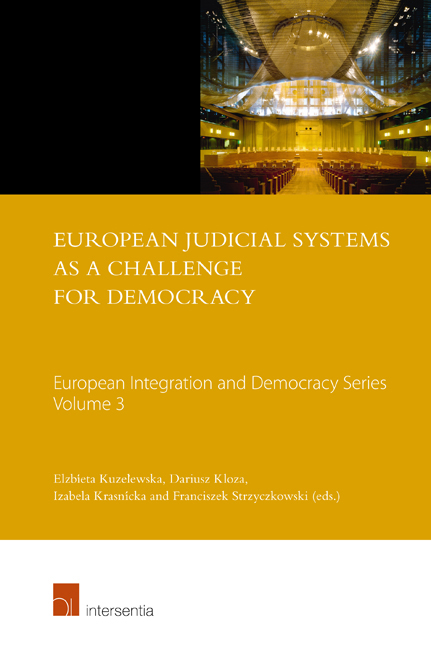
- Publisher:
- Intersentia
- Online publication date:
- December 2017
- Print publication year:
- 2015
- Online ISBN:
- 9781780685236

The role of the European judiciary in the process of European integration cannot be overestimated. The achievements of European integration after the second world war are usually analyzed from the perspective of political decisions that were made, initially, by the Founding Fathers and, subsequently, by the political leaders of the European countries. However, in the public debate we very often forget how much we owe to the two supreme jurisdictions of Europe, that is the Court of Justice of the European Union and the European Court of Human Rights. The continuing extension of the competences of the European Union, especially in the field of economic and monetary policy, calls for a new assessment of the nature of the decision-making process at the European level.From the foreword by Prof. Maciej Szpunar, Advocate General at the Court of Justice of the European Union'The European judiciary - i.e. the Court of Justice of the European Union (CJEU), the European Court of Human Rights (ECtHR) and national courts interpreting and applying European law sensu largo - have shaped [the process of European integration] actively, alongside the Founding Fathers, European nations, European states and their citizens. The involvement of the judiciary raises its own wide range of questions concerning the very nature of democracy. Much ink has already been spilled over issues such as democratic legitimacy, subsidiarity and accountability, the rule of law or judicial activism.[...] seventeen scholars from across Europe [...] share their views on the European judiciary as a challenge for democracy. The various contributions to the present volume are split into two parts. The first provides ten chapters on the judicial systems of the European Union (EU), discussing, inter alia, recognition of democratic principles in the case law of the CJEU, contribution thereof to the democratisation of the Union and reception of EU law in the Member States. The second part discusses the judicial means to protect human rights in Europe, consisting of three chapters devoted to the promise of advisory opinions of the ECtHR as well as to democratic standards for voting and for fair trial.From the preface by the Editors'[...] the editors, authors and the publisher of this volume decided to take a closer look at the relation between democracy and activities of something that might be called "European judicial systems". And what is intriguing - these systems are perceived here as a challenge for democracy.[...] This book does not exhaust all problems and issues for European judicial systems confronted with the very notion of democracy; there are simply too many of them. But it comes with a fresh look on - perhaps - the most pertinent ones, like the issue of the legal creativity of judges in both Luxembourg and Strasbourg. It was worth waiting for this volume.'Prof. Dr. Paul De Hert, Free University Brussels and Tilburg University
 Loading metrics...
Loading metrics...
* Views captured on Cambridge Core between #date#. This data will be updated every 24 hours.
Usage data cannot currently be displayed.